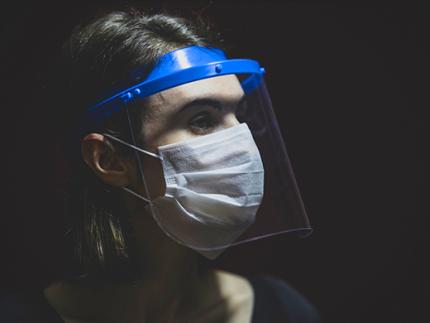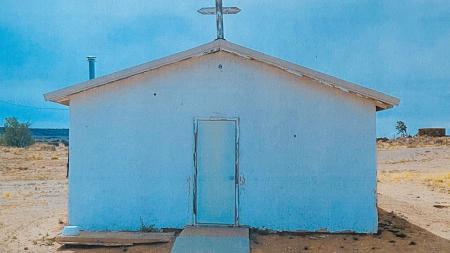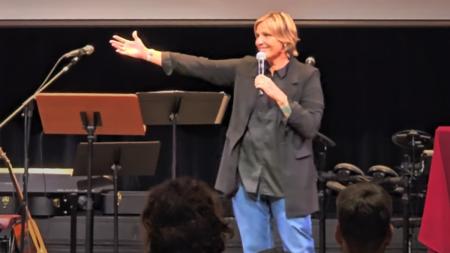‘Do you have holy water?’

To maintain confidentiality and personal privacy, we have changed names and some details in this story featuring a spiritual care provider who serves as a chaplain for the Christian Reformed Church in North America.
The phone call came from the intensive care unit at the hospital where Elizabeth had been serving for more than three years as a spiritual health practitioner. In her role she would usually be at a patient’s bedside, offering spiritual assistance in a variety of ways.
But instead of working at the hospital in western Canada, the Christian Reformed Church in North America chaplain had been sent home — along with other members of the hospital’s spiritual care team — because of the COVID-19 virus crisis.
“It was a bit controversial being sent home,” said Elizabeth. “The hospital deemed our work as essential services, but management felt we were more useful answering calls at home, providing emotional and spiritual support to patients, families, and staff by phone.”
So, lately, Elizabeth had been connecting with and helping patients and staff over the phone. However, in some situations exceptions were made so that a member of the spiritual care team could come in to provide end-of-life care. And that is what the phone call from the ICU was about.
“They asked me if I could speak to the wife of a man who was being cared for in the unit — and I told them ‘Certainly,’” she said.
Not surprisingly, the call was intense; the wife was hurting, and, soon after they began to speak on the phone, she broke down crying. Through the sobs, she tried to explain her flood of emotions.
“I am sorry to cry,” she said. “I have to stay strong for my husband. We were first in the emergency unit a couple of nights and, because of the coronavirus restrictions, we were not allowed to sit with him.”
Once Cliff, her husband, got into the ICU, it was determined that he didn’t have the virus. Even so, he was in failing health, and only one family member was allowed to sit with him at a time. His wife tried through it all to be strong, even though Cliff was placed into comfort-care.
“He is intubated [breathing through a tube]. It is difficult to sit with him, but I know he knows I am there,” the wife said. “But I don’t allow myself to cry around him or my daughter . . . . For some reason, while talking to you, I can’t stop crying!”
The chaplain reassured Cliff’s wife it was okay to let the tears flow, assuring her that “this was a normal reaction to an abnormal situation, and it would help her to cope with her stress and grief.”
After a while, Cliff’s wife asked if Elizabeth could visit her husband. “I know that only one visitor is allowed at a time, but can you please see him?” she asked.
Being a Roman Catholic family, they wanted Cliff to receive the blessing known in the Catholic Church as the Sacrament of the Sick, or Last Rites. But the priest, who would normally perform the sacrament, wasn’t available.
“It would mean so much to us if you could come in. Could you pray with him and bless him? Can you make sure you do it
with holy water?” asked Cliff’s wife.
Elizabeth assured her she would visit Cliff. But after the call her mind began to race, considering the many aspects of the wife’s request — and, especially, she said, “Where am I going to find some holy water?”
Often working with people of many faiths or no faith at all, Elizabeth was used to responding to all kinds of requests. With everyone she seeks to show the love of Christ, she said.
But using holy water to anoint someone is not part of the Protestant tradition. Normally she would ask the priest to do this or ask a colleague where to get some holy water. But that wasn’t possible at the moment.
Perplexed, she paused to pray, wishing to honor the wife’s request, hoping God would let her know where she could find holy water.
“But instead,” she said, “I heard the Lord’s gentle whisper, ‘If you pray over the water, it will become holy water.’ Oh, okay. That was it. A simple instruction. . . . so I found a spare small container, put some water in it, and asked the Lord to bless it.”
Elizabeth said that having this holy water reminded her of the prophet Elisha and the widow with her jar of oil (2 Kings 4:1-7). In this Scripture story, the widow needs to pay off a creditor who has threatened to take her two sons as slaves. When the prophet asks her if she has anything of value to sell, she answers, “Only a small jar of olive oil.”
The prophet instructs her to ask her neighbors for empty jars, as many as they can spare. Once she has the jars, she starts pouring her oil into the jars — and something miraculous happens.
“Through Elisha, God multiplies the widow’s jar of oil so that she can sell it, pay off her debts, and avoid losing her two sons into slavery,” said Elizabeth.
Recalling this Scripture brought back memories of being a single mother for many years, said Elizabeth, and, lacking enough resources, how she would sometimes joke with the Lord, saying, “Hey, I could use one of those widow jars! Where is my jar? Sometimes I would stick my hand in a jar and . . . surprise! Nope, nothing!”
Nonetheless, the Lord always provided what she and her children needed, she said. Fortified by this memory, Elizabeth went to the hospital with the holy water, acknowledging that God blesses people in and through various ways.
The staff in the ICU thanked Elizabeth for coming in. They directed her to Cliff’s room, and, wearing a mask and gloves, she entered and saw what you typically see in the ICU — tubes and wires connecting the patient to various machines. The patient’s eyes were closed, and he looked unconscious.
“What was not typical for me was that no family members were present,” said Elizabeth. “I am used to them being by the bedside and including them.”
Not sure that Cliff could even hear her, Elizabeth introduced herself and explained that his family wanted her to bless him. “I always act as if the patient can hear me, and I respectfully wait as if they can answer — even if they cannot talk or they are unconscious,” she said.
After a few moments, she asked Cliff if it was okay to pray with him and bless him. Though there was no response, she took the holy water and marked the sign of the cross on his forehead and leaned in so that he could hear her blessing.
“After the blessing, I continued to pray what I often pray, that he would know the Lord is present and know his peace — and that God will walk with him through this and how much God loves him,” said Elizabeth. “I asked the Lord to heal him inside and out and in whatever way the Lord thinks best.”
Emotionally moved and spiritually touched by the experience, Elizabeth said she knew the Lord was present. When the nurse came in to check one of the monitors, the chaplain could tell by the tear in her eye that she was also moved. “As I left, she thanked me for coming in. . . .”
Later Elizabeth followed up with the man’s wife on the phone again and told her about the prayer and the holy water.
Cliff’s wife thanked her, saying it meant so much to their family that she went in and prayed a blessing for him in person.
Elizabeth found out later that Cliff lived another month longer than was expected. She believes that the blessing and prayer and holy water made a difference.
“I trust God with what is needed. Sometimes the patient and family have more time to say goodbye and get ready for death, and sometimes healing means dying and going where there is no pain,” she said.
When she thinks of Elisha and the widow with her jar of oil, Elizabeth said, she knows miracles happen; she knows God provides, especially at times when all seems most bleak.
“When we think we have nothing, God takes the ordinary and transforms it into exactly what we need — and in the process it becomes a way to grow our faith and that of others. That is the real miracle,” she said.
In the end, we all need a widow's jar. And so, Elizabeth added, "Where is your widow's jar?”


